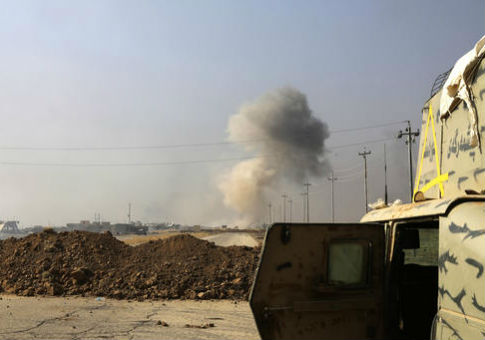Islamic State leader Abu Bakr Al-Baghdadi survived an uprising within his own police force Monday as U.S. led-coalition forces pushed toward Mosul with only light resistance, according to Iraqi lawmakers.
"ISIS has overcome a coup attempt by the ‘Islamic Police’ in the city of Mosul. It added that tens of persons were executed and that the leader of the coup was killed while ISIS regained control over its entire headquarters," according to a translation of a report from Al Sumeria TV. The fighting reportedly took several hours.
The same news agency reported earlier that ISIS police cars were announcing through loudspeakers that Baghdadi’s rule is over, his family was arrested, and he escaped to Raqqa, the terrorist group’s headquarters in Syria. Thirteen ISIS leaders and their associates are missing, according to a translation of Al Sumeria’s report.
The leader of the ISIS religious police was killed, along with a number of his aides, and the jihadist group "conducted mass executions of dozens of religious police militants in locations where the clashes took place," Sputnik reported Monday.
The incident was confirmed by members of the Iraqi parliament who spoke to the Washington Free Beacon.
"Yes, it is true. Some of the young guys in Mosul are fighting back against Daesh [slang for ISIS]," said Yonadam Kanna, an Assyrian Christian Member of the Iraqi Parliament. "There was a fight by police in the city, but I cannot say how many people were killed."
"There are little groups inside Mosul that are rising up, and the Iraqi government says they are coordinated and in touch with each other," said Ershad Salihi, an MP and head of the Iraqi Turkmen Front.
CNN confirmed reports of resistance in Mosul on Sunday.
The attack on the city began at 1:00 a.m. in the village of Al-Khazer, approximately 18 miles Southeast of Mosul by 4,000 Kurdish Peshmerga forces supported by U.S., French, and Iraqi artillery. Iraqi army units are advancing from Gwer east of Mosul, according to Arabic media reports.
The top coalition general in Iraq, U.S. Army Maj. Gen. Gary J. Volesky, highlighted the leading role played by the Iraqis in the operation.
"Mosul will be a hard fight, but the Iraqi security forces are ready. They’ve been waiting to liberate Mosul for two years, and today is the day," said the commanding general of Combined Joint Forces Land Component Command–Operation Inherent Resolve and the 101st Airborne Division (Air Assault). There are approximately 850 targets that Iraqi and coalition aircraft will strike in the coming days.
There were combat movements in the north of the city near Mosul Dam, on the east of Mosul, and in the southeast, according to Kanna. Some of the volunteer battalions include 600 Christian fighters belonging to the Nineveh Plains Protection Unit.
"ISIS is demoralized and they are pulling back. The Iraqi security forces advanced several kilometers today on the east and southeast. They are using vehicle bombs, improvised explosive devices, and mines to slow the advance of the assault troops," Kanna said.
"The counterterrorism troops and Peshmerga stopped today just close to the Christian city Bartella, approximately eight miles from Mosul," he added.
Reports from operatives inside Mosul, Iraq’s second largest city, said that ISIS withdrew from the east side of the Tigris River in Mosul, and the power was cut throughout the city from midnight. Bridges between the two sides were booby trapped. These reports are based on callers inside the city who are risking their lives to make the calls. Using mobile phones in Mosul is punishable by with death.
Civilians are still able to leave the city, and on Monday 100 families arrived in the receiving center north of Mosul, Kanna said. Prices of food and essential items have risen in recent weeks, but the civilians are not facing starvation. "This situation is not at all like it was in the battle of Fallujah in May," Kanna said.
The battle for the city reportedly may take several weeks, according to military spokesmen. As the counterterrorism units get closer to the city limits they likely will be bogged down by house-to-house fighting, Kanna noted. The number of ISIS defenders is approximately 6,000 men, who are at fighting positions at the perimeter of the city, and as many as 3,000 teenage boys, so-called cubs of the Caliphate, who are holding positions in the inner city, he said. The assault forces will face defenders using tunnels stretching for miles and possibly thousands of mines.
"After ISIS goes down, we will need some kind of international peacekeeping force to prevent violent reprisals by invading forces," Kanna added. He pointed out that several tribes and ethnic groups split over whether to support ISIS when it invaded northern Iraq in June, 2014.
"In Nineveh Province, we could have clashes between Sunni Arabs, between Sunni Turkmen, and Shia Turkmen in Tal Afar, and between pro-ISIS and anti-ISIS Shabbaks," Kanna said.
The uprising reported by Sumeria may reflect an effort by some ISIS cadre to switch sides now that the defeat of the jihadist group is close to ending.
"Some Daesh fighters are changing their skins, so that they can say they were never guilty of raping Yezidi women or beheading innocent people," said Ali Sada, the editor of Daesh Daily, a comprehensive war digest. "And this also explains why the Turkish army is in the area, it’s there to protect them."
Saad Khalis in Baghdad contributed to this report.
